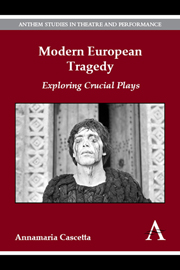Book contents
- Frontmatter
- Dedication
- Contents
- Acknowledgements
- Introduction: The Tragic, Tragedy and the Idea of the Limit
- Chapter 1 Hubris and Guilt: Gengangere (Ghosts)
- Chapter 2 Eve Becomes Mary: L'annonce faite à Marie (The Tidings Brought to Mary)
- Chapter 3 The School of Hatred: Mourning Becomes Electra
- Chapter 4 The Destiny of Man Is Man: Mutter Courage und ihre Kinder (Mother Courage and Her Children)
- Chapter 5 The Tragic and the Absurd: Caligula
- Chapter 6 Dianoetic Laughter in Tragedy: Accepting Finitude: Endgame
- Chapter 7 The Arrogance of Reason and the ‘Disappearance of the Fireflies’: Pilade (Pylades)
- Chapter 8 The Apocalypse of a Civilization: From Akropolis to Apocalypsis cum figuris
- A Provisional Epilogue: Between the Experience and the Representation of the Tragic: Towards a Performative Theatre
- Appendix: Chronology of Productions
- Notes
- Index
Chapter 7 - The Arrogance of Reason and the ‘Disappearance of the Fireflies’: Pilade (Pylades)
Published online by Cambridge University Press: 05 September 2014
- Frontmatter
- Dedication
- Contents
- Acknowledgements
- Introduction: The Tragic, Tragedy and the Idea of the Limit
- Chapter 1 Hubris and Guilt: Gengangere (Ghosts)
- Chapter 2 Eve Becomes Mary: L'annonce faite à Marie (The Tidings Brought to Mary)
- Chapter 3 The School of Hatred: Mourning Becomes Electra
- Chapter 4 The Destiny of Man Is Man: Mutter Courage und ihre Kinder (Mother Courage and Her Children)
- Chapter 5 The Tragic and the Absurd: Caligula
- Chapter 6 Dianoetic Laughter in Tragedy: Accepting Finitude: Endgame
- Chapter 7 The Arrogance of Reason and the ‘Disappearance of the Fireflies’: Pilade (Pylades)
- Chapter 8 The Apocalypse of a Civilization: From Akropolis to Apocalypsis cum figuris
- A Provisional Epilogue: Between the Experience and the Representation of the Tragic: Towards a Performative Theatre
- Appendix: Chronology of Productions
- Notes
- Index
Summary
The Idea of the Tragic: Between Structure of the Human and Historical Transformation
The idea of the tragic is elaborated with great intellectual commitment and elevated poetry in Pier Paolo Pasolini's writings for the stage. His work follows a distinctive and original path which we can rightly include in the map of fundamental twentieth-century developments in the genre.
In Pasolini it is not so much philosophical culture as literary (in this case ancient Greek drama) and anthropological culture that constitute the matrix of the work in consideration and provide the basic ideas with which the universal experiences of the limit and necessity are reinterpreted. The tragic action is presented as an arrogant and absolute affirmation of one-dimensional man, that of abstract standardized reason, which overwhelms all individual differences, cultures and desires. But it also represents the other side: bloody revolution followed by solitude incapable of mediation and reciprocity.
The Theatre as ‘Cultural Ritual’
In the mid-sixties, when the Italian avant-garde gathered at the Conference in Ivrea and the ‘new theatre’ was established in Europe by the journal Nuovi Argomenti, Pasolini launched a provocation, hotly controversial in its tones but prophetic in its lucidity: the ‘Manifesto per un nuovo teatro’. He had already produced his theatrical corpus.
- Type
- Chapter
- Information
- Modern European TragedyExploring Crucial Plays, pp. 101 - 116Publisher: Anthem PressPrint publication year: 2014



